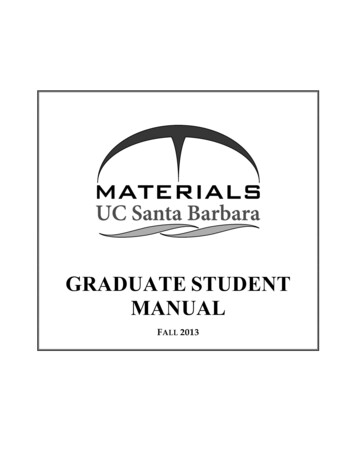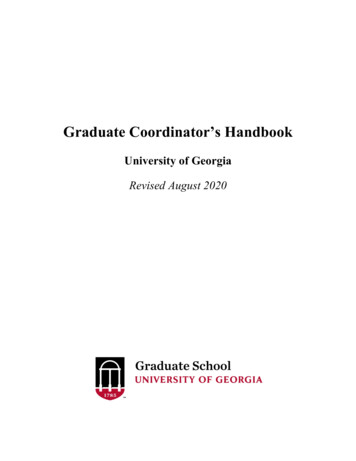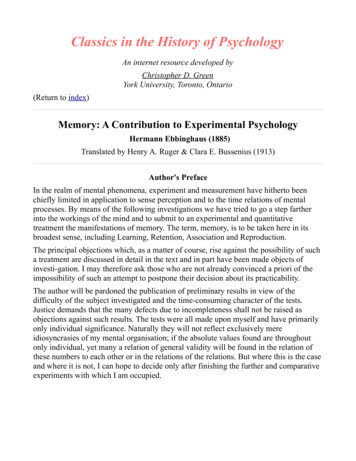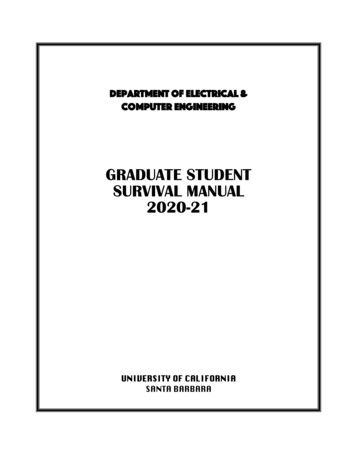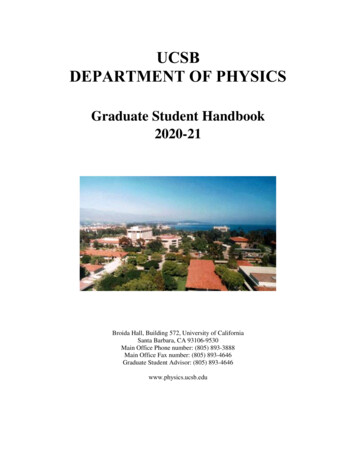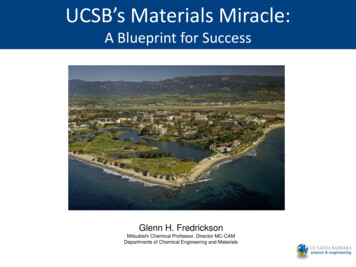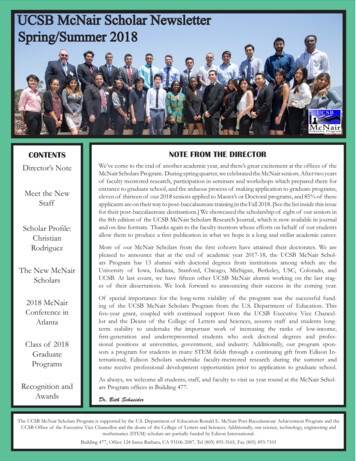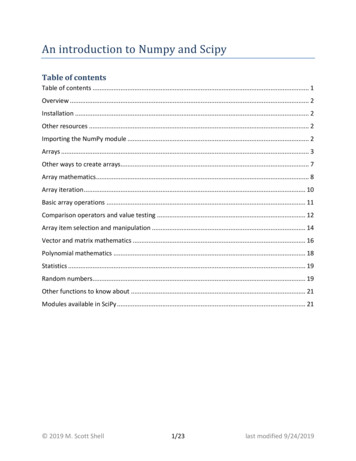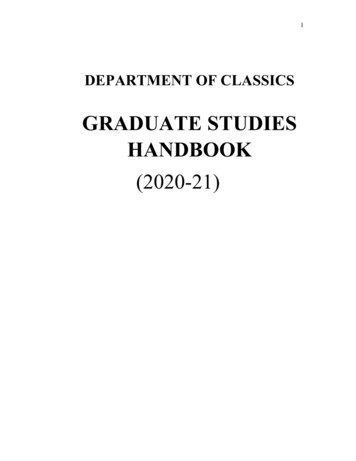
Transcription
1DEPARTMENT OF CLASSICSGRADUATE STUDIESHANDBOOK(2020-21)
2TABLE OF CONTENTSGeneral CommentsI. ADMINISTRATION OF THE GRADUATE PROGRAMI.1 Graduate CouncilI.2 Graduate DivisionI.3 Graduate AdvisorI.4 Graduate Affairs Advisory CommitteeI.5 Graduate Program AssistantI.6 Graduate RepresentativeII. THE GRADUATE PROGRAM IN CLASSICSII.1 ProgramsII.2 DeadlinesII.3 AdmissionII.4 Progress toward the DegreeIII. GENERAL REGULATIONS AND DEGREE REQUIREMENTSIII.1 University RegulationsIII.2 Degree Requirements: Ph.D. in ClassicsIII.3 Degree Requirements: Ph.D. in Classics, Emphasis inLiterature and TheoryIII.4 Degree Requirements: Ph.D in Classics, Emphasis inAncient HistoryIII.5 MA in ClassicsIII.6 Review of Progress toward the degreeIV. EXAMINATIONSIV.1 Examinations: An OverviewIV.2 General PoliciesIV.3 Greek and Latin Sight ExaminationsIV.4 Greek and Latin Sight Examination for Emphasis inAncient HistoryIV.5 Modern Language ExaminationsIV.6 Examination Committees and Student AdvisorsIV.7 Author/Genre ExamIV.8 The Significant PaperV. ADVANCEMENT TO CANDIDACY AND DISSERTATIONV.1 Qualifying Examination for Ph.D inin Classics with Emphasis in Literature and TheoryV.2 Qualifying Examination for Ph.D. inClassics with Emphasis in Ancient HistoryV.3 Advancement in Ph.D Candidacy and Thesis ProposalV.4 Dissertation CommitteeV.5 616171718181918
3V.6 Defense of DissertationV.7 Formatting and Filing the Dissertation1920VI. ACADEMIC REGULATIONSVI.1 Course LoadVI.2 Registration for ClassesVI.3 Adding and Dropping ClassesVI.4 GradesVI.5 Incomplete GradesVII. COURSESVII.1 Directed Reading and Research coursesVII.2 Reading CoursesVII.3 SeminarsVIII. FINANCIAL SUPPORTVIII.1 California ResidencyVIII.2 Departmental ProceduresVIII.3 Important Information for International StudentsVIII.4 Funding for Conference Papers and Other ProjectsIX. TEACHING ASSISTANTSHIPS20202121222223232323232324242525IX.1 AppointmentsIX.2 AssignmentsIX.3 TrainingIX.4 DutiesX. PROFESSIONAL DEVELOPMENTX.1 SeminarX1. FURTHER NOTESX1.1 Office StaffX1.2 Departmental Facilitiesa) Keith Aldrich Memorial Graduate Reading Roomb) Officesc) Computers252526272727282828282828
4General Comments: Regulations contained in this handbook are subject to revision by theUniversity or Departmental faculty. Information comes from the UCSB Graduate Advisor'sHandbook, the University Catalog and various departmental documents. If you have questionsabout anything in this handbook or notice discrepancies, please consult with the graduate advisor.I.ADMINISTRATION OF THE GRADUATE PROGRAMI.1Graduate CouncilThe Graduate Council is a standing committee of the Academic Senate and representsall academic disciplines and colleges. Graduate Council consists of twelve facultymembers, two representatives of the Graduate Student Association, and the deans ofthe Graduate Division, who are ex officio members. Graduate Council does thefollowing: establishes standards for graduate admission, academic progress andrequirements, awarding of degrees, and the appointment of student academic titles;authorizes all graduate courses; sets criteria for distribution of fellowship money andselects recipients for certain fellowships; appoints committees in charge of candidates'studies; and approves proposals for new graduate degree programs.I.2Graduate DivisionThe Graduate Division is the administrative arm of the Graduate Council. Led by thedeans, associate dean, and assistant dean, the Graduate Division employs a career staffof about twenty people, who are assisted by part-time student helpers. GraduateDivision has three main operating groups: graduate outreach and admissions, financialsupport, and graduate academic services. For their responsibilities, see the GraduateAdvisor's Handbook.I.3Graduate AdvisorThe objectives of the Graduate Division and the departmental advisor are the same: toensure the best possible selection of entering students and thereafter to guide them inan orderly trouble-free fashion through the steps to a degree.The graduate advisor is an administrative appointment, made by the Dean of theGraduate Division, normally on the recommendation of the department chair. Thegraduate advisor's signature is the only departmental signature, other than the Chair's,recognized as official on forms and petitions presented by graduate students. It is thegraduate advisor who evaluates and approves students' study lists, advises them onadvancement to candidacy and considers their petitions to change programs, to add ordrop courses, to waive or substitute requirements, to take leaves of absence, etc.The duties of the graduate advisor include but are not limited to the following:The graduate advisor meets regularly with graduate students to advise them on theirstudy program and requirements for the degree. All students should arrange to meet withthe graduate advisor at the beginning of the fall quarter for advising and are stronglyurged to consider quarterly appointments.
5The graduate advisor, along with the chair of the student’s examination committeeannually reviews the progress which that student is making toward the degree. Themeeting generally occurs towards the end of the spring quarter. The graduate advisorproduces a memo reviewing the meeting’s major points of discussion, and places onecopy in the student’s academic file and gives another to the student. If progress is notsatisfactory, the graduate advisor will inform the student in writing and makesuggestions about means of improving performance.The graduate advisor, in conjunction with the Graduate Affairs Committee and inconsultation with other faculty where appropriate, oversees admissions procedures forincoming graduate students, departmental recommendations for University fellowshipsand distribution of departmental financial aid, including teaching assistantships.I.4Graduate Affairs Advisory CommitteeThe membership of this committee is comprised of tenured or tenure-track members ofthe Classics department faculty, including the graduate advisor. It advises the graduateadvisor when it is impossible or unreasonable to summon a meeting of the entirefaculty on such issues as student petitions.1.5Graduate Program AssistantThe Graduate Program Assistant is responsible for administrative advising of graduatestudents. For example, the Graduate Program Assistant reminds students aboutregistration and fellowship deadlines, stays abreast of requirements from the GraduateDivision and University, and manages requisite administrative records on behalf of thedepartment and its graduate students.1.6Graduate RepresentativeIn accordance with the Graduate Student Association regulations, the Classicsdepartment is allowed one graduate representative to serve on the GSA council, whichmeets monthly. Each fall the Classics Graduate Representative is elected by thegraduate students of the Classics department. Regular attendance by the representativeat the monthly GSA meetings results in money being placed in a fund (at the rate of 50cents per graduate student). This money accumulates until it is spent. The GraduateRepresentative should consult with all the graduate students in an effort to decide howthe money should be spent.In addition, a Faculty-Student Liaison Committee provides a forum for regular andmore detailed student feedback and governance. The committee comprises the graduateadvisor, the undergraduate advisor, and two student representatives, one graduate, oneundergraduate, who are elected annually by the graduate students and Classicsundergraduate majors respectively. The committee meets at least once a quarter, andbefore each department meeting when there is relevant business. This is an importantresponsibility: the graduate representative should take pains to ensure that s/he
6properly represents the graduate students and keeps them informed of matters ofconcern to them.II.THE GRADUATE PROGRAM IN CLASSICSII.1ProgramsThe Department of Classics offers a Ph.D. program in Classics (with optionalemphases in Ancient History and Literature and Theory) for students who havecompleted the B.A. or M.A. Students entering the program should be aware that theyare undertaking not only to deepen their enjoyment and understanding of ancientliterature but to explore their potential as interpreters, scholars, and teachers ofliterature, history, and language. The graduate program in Classics includes the studyof ancient history and cognate disciplines, as well as literature and language.II.2DeadlinesGraduate Division, in accordance with academic senate policy (i.e., university-wideregulations), has set the following deadlines:Ph.D. Degree Deadline: Doctoral candidates are expected to complete their degreerequirements within seven years of beginning graduate studies at UCSB if the studententers the program without an M.A. Students who exceed the seven-year limit mustpetition Graduate Council for an extension. Students who enter the program with anM.A. are expected to complete their degree requirements within five years of beginninggraduate studies at UCSB.Doctoral Candidacy Deadline: Students who enter the program without an M.A. arerequired to advance to doctoral candidacy within five years after entry into a graduateprogram. Students who enter the program with an M.A. are expected to advance todoctoral candidacy within three years after entry into the graduate program.II. 3 AdmissionsAdmission to the Ph.D. programs is determined by the faculty as a committee of thewhole. Faculty base their decisions on letters of recommendation, GREs, GPAs,statements of purpose, writing sample, requisite training and potential for success.In addition to the general requirements for admission to graduate status, applicants forthe Ph.D. degree program should have an undergraduate major in Greek, Latin, orClassics, or the equivalent, including at least 2 years of study of both Greek and Latin.Other students may be admitted if they demonstrate proficiency in the languages, butthey will be required to make up any deficiencies in their undergraduate training.Applications should address likely areas of scholarly interest and preparation fordissertation-writing so that appropriate faculty members can indicate a potentialwillingness to supervise the applicant’s Ph.D. work.
7II. 4 Progress toward the DegreeIt is the responsibility of students to ensure that they continue making good progress inthe program—i.e., to complete courses and pass exams in timely fashion. Progresstoward the degree will be reviewed annually by the graduate advisor and the chair ofthe student’s Ph.D. committee. Students should realize that academic performance andprogress toward the degree determine departmental and university funding.Grade point average is not in itself a sign of progress toward the degree. Particularlyimportant is evidence of steady satisfaction of requirements and performance on majorexaminations. For expected time-to-completion, see above, II.2.An important milestone in progress toward the degree comes after a student has passedboth Classical language exams and has finished (or is finishing) all coursework andpaper requirements. At this point the student’s attention will be turning increasingly tothe series of ‘field’ exams and ultimately the dissertation, and it becomes especiallyimportant for the student to be cultivating a good working relationship with one ormore faculty to help ensure successful completion of the PhD. Therefore, students whohave passed their second Classical language examination and have completed allcoursework and paper requirements must ask one faculty member to serve as their‘sponsor’ in moving forward to the second major phase of their graduate training. It ishoped that this sponsor will enthusiastically support the student’s advancement andprogress through the program (normally serving thenceforth as the student’s chiefadvisor and dissertation supervisor), but a faculty member is also free to decline toserve in this capacity, and a student’s inability to secure a sponsor would serve as avaluable early warning of difficulties ahead. Sponsorship of a student must beapproved by the Faculty at the next possible meeting, and while at this stagewithholding sponsorship is very unlikely this may be an occasion for frank assessmentof a student’s capability to complete successfully the remaining requirements for thePhD (viz., field exams and dissertation).III.GENERAL REGULATIONS AND DEGREE REQUIREMENTSIII.1University RegulationsCandidates for graduate degrees must meet university degree requirements found in the“Graduate Education” section of the UCSB online duateEducation/) as well as theDepartment’s own list of requirements. It will be their responsibility to comply with allsuch regulations.The Department offers a Ph.D. degree in Classics, Classics with emphasis in AncientHistory and Classics with emphasis in Literature and Theory. The Department does not
8offer an autonomous M.A. program. (See below, III.5.) Admission is to the Ph.D.program only. Master’s degrees may be awarded on an individual basis in the case ofstudents who wish to leave the Ph.D. program prior to completion, providing they havefulfilled the necessary requirementsNB: Students who enter the program with an MA from another institution may be entitledto request a waiver of some requirements that would duplicate work already doneelsewhere. (E.g. French translation exam, proseminar, parts or all of the 211-212-213survey, etc.; waivers are not granted for the Greek and Latin sight translation exams.)Students who hold an MA and who wish to request such a waiver should meet with theGraduate Advisor as soon as possible upon entry into the program.The Ph.D. in Classics with emphasis in Ancient History involves significantcoursework in the Department of History. The emphasis is designed for those studentswho wish their training to emphasize ancient history without sacrificing the classicallanguages. Students who desire to opt for this emphasis should have an undergraduaterecord that includes upper-division classes in Greek and Roman history.The Ph.D. in Classics with emphasis in Literature and Theory is designed for studentswho wish to combine solid training in the classical languages with broader study inliterature and theory. Students in this program will take graduate courses in literarytheory, gender studies, cultural theory, or other approved areas in cognate disciplines oncampus.Students considering these two Emphases should understand that the ‘regular’ ClassicsPhD does in fact leave significant room for coursework in ancient history and literary(and other) ‘theory.’ It is certainly not implied that the regular PhD is history-less andtheory-averse. On the contrary, Classics PhDs on the job market are typically expected toknow their way around relevant literary and other ‘theory’ and to know enough ancienthistory to ground their studies appropriately in the relevant culture. The Emphasestherefore are designed for those who want to go beyond this: for example, students whowant to focus their studies on ancient history or theoretical issues and are openrespectively to possible future employment in a History or (say) Comparative Literaturedepartment as well as Classics.The coursework and requirements for the three emphases differ, as follows:III.2Degree Requirements: Ph.D. in ClassicsIII. 2.1Course RequirementsA minimum of seventy-two letter grade units in Classics. History (Greek and Roman), orrelated subjects in Art History, Religious Studies, or Philosophy, must be completed inorder to receive the Ph.D. in Classics
9The Following Core Courses will be required: Proseminar (Classics 201) Survey of Greek and Latin literature (Classics 211, 212, 213)This series will provide a starting-point for preparation for the Greek and Latinliterature written and oral exam that the student will take as the last step toadvance to candidacy.These courses alone among required courses must be taken S/U. See below VI.4. Greek Prose Composition (240) AND Latin Prose Composition (210) 1 Greek or Roman History Course (if not fulfilled beforehand) from the following list:Classics 150, Classics 151, Classics 233, Classics 234, History 111ABCEQ,History 112ABCQ, History 211AB, History 213AB 6 Seminars, 1 of which may be taken outside the Department.Students whose research interests are interdisciplinary may apply 2 extradepartmental seminars to the 6-seminar requirement after consulting with theirFaculty Advisor and obtaining the approval of the Graduate Advisor. (A petitionfor an exception should be submitted to the Graduate Advisor within reasonabletime before the quarter in which the 2nd extra-departmental seminar begins.)III.2.2Exam and Paper Requirements 2 short papers (2,000 words minimum, excluding quotations) 6 Seminar papers written while in the Ph.D. program (3,000 words minimum, excludingquotations).1 of the 6 seminar papers may have been written on a Classics or related topic fora seminar taken outside the Department. A student may apply 2 extradepartmental seminar papers on Classical topics to the 6-seminar paperrequirement, but the second paper must come from a second extra-departmentalseminar that the student has successfully petitioned (see above, "Courserequirements") to apply to the coursework/seminar requirement.Students are asked to submit a copy of each graded paper to the Graduate Advisoras soon as possible after the completion of the course. A paper submitted tosatisfy the paper requirement must have received a grade of at least a B from theinstructor in the course for which it was written. Greek Sight Translation Exam Latin Sight Translation Exam German Translation Exam French or Italian Translation Author/genre Exam, normally in the language of the dissertation Significant Paper on a topic or area that is expected to contribute to the dissertation;also to be presented orally to the department Greek and Latin Literature qualifying exam with both written and oral components
10III.3Degree Requirements: PhD in Classics, Emphasis in Literature andTheoryIII.3.1 Course RequirementsA minimum of seventy-two letter grade units in Classics. History (Greek and Roman), orrelated subjects in Art History, Religious Studies, or Philosophy, must be completed Survey of Greek and Latin literature (Classics 211, 212, 213)This series will provide a starting-point for preparation for the Greek and Latinliterature written and oral exam that the student will take as the last step toadvance to candidacy.These courses alone among required courses must be taken S/U. See below,VI.4. Proseminar (Classics 201) Greek Prose Composition (240) OR Latin Prose Composition (210) 1 Greek or Roman History Course (if not fulfilled beforehand) from the followinglist, if not satisfied by undergraduate work: Classics 150, Classics 151, Classics 233,Classics 234, History 111ABCEQ, History 112ABCQ, History 211AB, History213AB 6 Seminars, of which typically at least 4 must be Classics Dept seminars 3 graduate courses (which may include some of the seminars just mentioned) with atheory component, of which at least 1 must be taken outside the DepartmentIII.3.2Exam and Paper Requirements 2 short papers (2,000 words minimum, excluding quotations) 6 seminar papers written while in the Ph.D. program (3,000 words minimum,excluding quotations). Of these, 4 will typically have been written for Classics Deptseminars. At least 2 of these 4 papers written for Classics Dept seminars mustdemonstrate the use of theory.Students are asked to submit a copy of each graded paper to the Graduate Advisor assoon as possible after the completion of the course. A paper submitted to satisfy thepaper requirement must have received a grade of at least a B from the instructor in thecourse for which it was written. Greek Sight Translation Exam La
Ph.D. Degree Deadline: Doctoral candidates are expected to complete their degree requirements within seven years of beginning graduate studies at UCSB if the student enters the program without an M.A. Students who exceed the seven-year limit must petition Graduate Council
